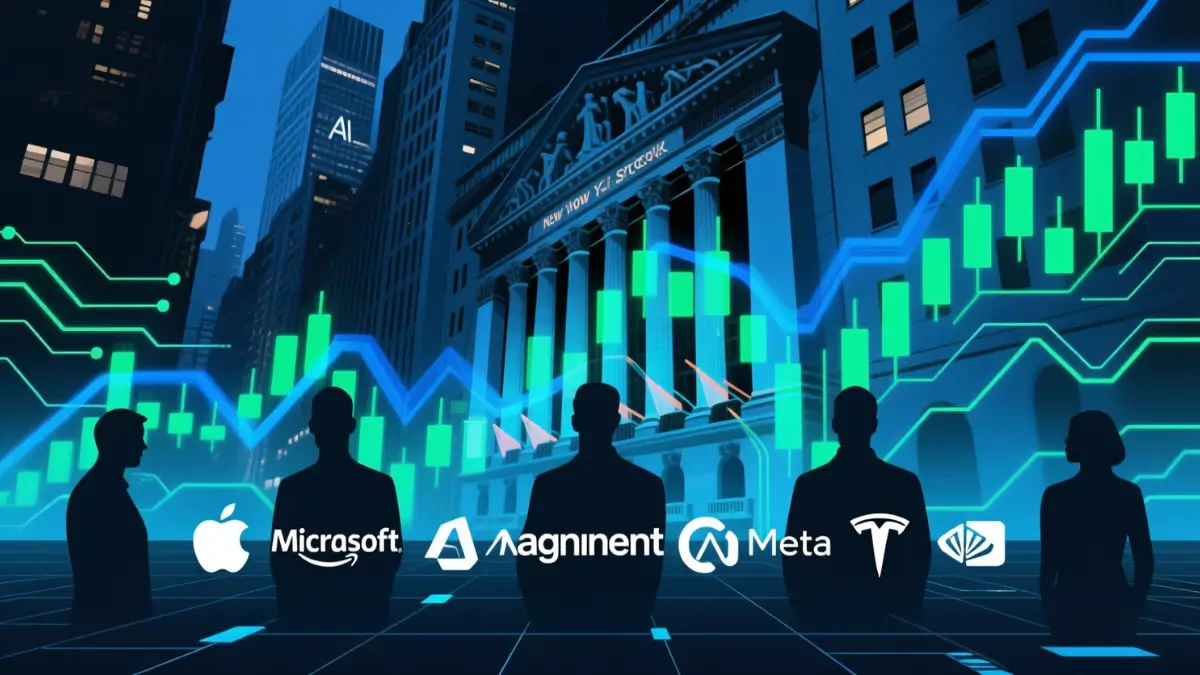The U.S. stock market has been riding a powerful wave for nearly 18 months, and at the center of it all are the “Magnificent 7”—Apple, Microsoft, Amazon, Alphabet (Google), Meta, Tesla, and Nvidia. Together, these companies now make up nearly 40% of the S&P 500’s total value, essentially shaping the direction of Wall Street.
Fueled by the promise of artificial intelligence (AI), these giants have seen their stock prices soar, attracting billions of dollars from investors who are betting on AI to reshape the future. But recently, cracks have begun to appear in the glossy surface of AI optimism. The real question now: Are Big Tech stocks dangerously overvalued?
The Magnificent 7 and Their Market Power
What makes the Magnificent 7 unique is how interconnected they are in the AI ecosystem. Microsoft depends on Nvidia’s chips to power its Azure cloud and AI services. Meta spends billions on Nvidia hardware to build its AI infrastructure. Tesla continues to push AI into self-driving technology, while Alphabet and Amazon pour resources into AI-driven cloud and consumer products.
This tight loop of collaboration and dependency has amplified their market influence, pushing stock prices higher and higher. But the very same loop also makes the market extremely vulnerable—when one of them slips, the entire index feels the impact.
Market Warning Signs
In recent sessions, Wall Street has seen turbulence:
- The NASDAQ dropped by 1.5%.
- The S&P 500 slid 0.6%.
- Nvidia alone fell 3.5% in a single day.
Interestingly, while nearly 70% of the S&P 500 companies showed gains, the index still moved lower because losses in the tech giants dragged everything down. This underscores how much the market currently depends on just a handful of companies—a risky concentration of power.
MIT Study Sparks Jitters
A new report from MIT has poured cold water on AI hype, revealing that 95% of AI pilot projects fail. This stark statistic has forced investors to reassess whether the massive spending on AI is actually delivering sustainable returns.
Adding to the uncertainty, Meta—which only months ago was aggressively hiring AI talent with high salaries—is now rumored to be downsizing parts of its AI division. For investors, this sudden shift raises red flags: if one of the biggest champions of AI is reconsidering its strategy, what does that mean for the long-term outlook?
The Cost of Building AI
There’s no denying that AI is a transformative technology. But its costs are astronomical. In 2025 alone, companies are projected to spend $400 billion on AI infrastructure—an amount comparable to the GDP of South Africa.
The spending includes billions to train advanced models and even more to run them at scale. While the logic seems to be “spend now, dominate later,” revenue streams are still murky. This raises a big concern: can these investments truly pay off before budgets start to tighten?
Hype vs. Reality
History offers a valuable reminder. The late 1990s dot-com bubble saw sky-high valuations collapse when expectations outpaced reality. Today, AI carries the same risk.
Yes, AI is set to revolutionize industries—from healthcare to finance to retail—but breakthroughs rarely happen in a straight line. The current market sentiment is beginning to reflect this caution:
- Investors are questioning whether valuations for companies like Nvidia, Meta, and Microsoft are inflated.
- Analysts warn that Wall Street may be pricing in AI success years before it can actually deliver tangible returns.
What’s Next for AI and Big Tech?
So, where does this leave investors? The AI revolution is far from over, but the reality is more complicated than the hype suggests. High failure rates, massive costs, and shifting corporate strategies all point to a bumpy road ahead.
Here are a few takeaways:
- AI has potential, but patience is key. The market may have gotten ahead of itself in expecting instant results.
- Diversification matters. Depending too heavily on a few Big Tech stocks exposes investors to unnecessary risk.
- Reality checks are healthy. Pullbacks in tech valuations could set the stage for more sustainable long-term growth.
Bottom Line
The AI era is here, but Wall Street’s euphoria may have gotten ahead of the technology itself. Big Tech stocks remain powerful drivers of the market, yet their valuations are increasingly under scrutiny.
For investors, the challenge is to navigate between ambition and pragmatism—recognizing AI’s transformative promise while keeping a close eye on financial realities. The hype cycle may eventually give way to genuine breakthroughs, but until then, caution is the smartest investment strategy.

